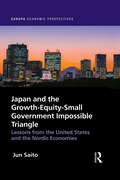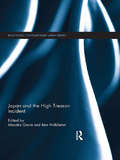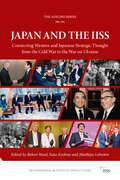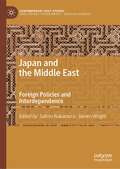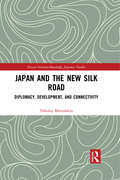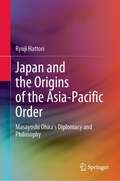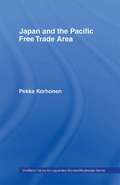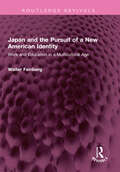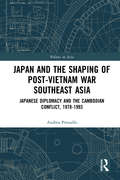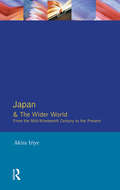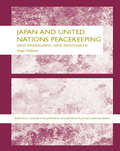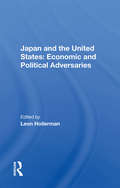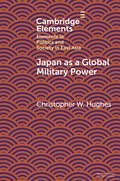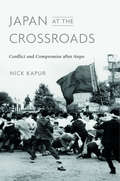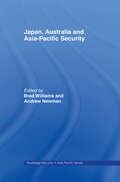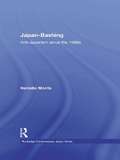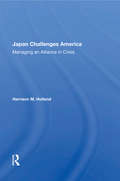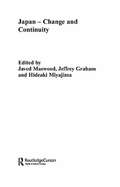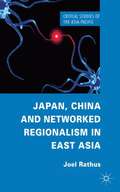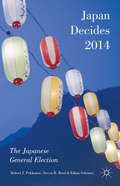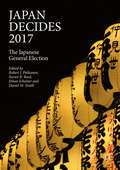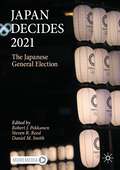- Table View
- List View
Japan and the G7/8: 1975-2002 (The University of Sheffield/Routledge Japanese Studies Series)
by Hugo DobsonThis book analyses Japan's international relations and participation in the multilateral forum, the G8, since its creation in 1975. The author explores the motivation of the Japanese government and non-governmental actor's aims and objectives and examines how and to what extent they have been achieved. Presenting a wealth of new research this theoretically informed book will be of interest to those studying interntional relations and Japanese politics.
Japan and the Growth-Equity-Small Government Impossible Triangle: Lessons from the United States and the Nordic Economies (Europa Economic Perspectives)
by Jun SaitoThis volume examines and analyzes the current situation of, and the future prospects for, the Japanese economy, particularly in the context of inequality. The country's economy is facing the ageing and the shrinking of its population, both of which will reduce the potential growth rate, which has already become very low. By introducing a new policy framework, namely the `Equity-Growth-Small Government Impossible Triangle', based on reviewing, comparing and contrasting the policies of the United States, the Nordic economies and Japan, the book proposes a policy direction that could be pursued by Japan. If Japan wants to sustain growth while preventing inequality to widen and preserve an egalitarian society, there is no other choice but to further promote globalization and innovation and, at the same time, surrender preserving a small government by reforming itself to become a dynamic and resilient welfare state. The volume will be an invaluable resource for students, professionals and researchers with an interest in economics, inequality, the Japanese economy and comparative economic policies.
Japan and the High Treason Incident: Japan And The High Treason Incident (Routledge Contemporary Japan Series)
by Masako Gavin Ben MiddletonThe ‘High Treason Incident’ rocked Japanese society between 1910 and 1911, when police discovered that a group of anarchists and socialists were plotting to assassinate the Emperor Meiji. Following a trial held in camera, twelve of the so-called conspirators were hanged, but while the executions officially brought an end to the incident, they were only the initial outcome as the state became increasingly paranoid about national ideological cohesion. In response it deployed an array of new technologies of integration and surveillance, and the subsequent repression affected not only political movements, but the whole cultural sphere. This book shows the far reaching impact of the high treason incident for Japanese politics and society, and the subsequent course of Japanese history. Taking an interdisciplinary and global approach, it demonstrates how the incident transformed modern Japan in numerous and unexpected ways, and sheds light on the response of authoritarian states to radical democratic opposition movements elsewhere. The contributors examine the effects of the incident on Japanese history, literature, politics and society, as well as its points of intersection with broader questions of anarchism, colonialism, gender and governmentality, to underline its historical and contemporary significance. With chapters by leading Western and Japanese scholars, and drawing on newly available primary sources, this book is a timely and relevant study that will be of great interest to students and scholars working in the fields of Japanese history, Japanese politics, Japanese studies, as well as those interested in the history of social movements.
Japan and the IISS: Connecting Western and Japanese Strategic Thought from the Cold War to the War on Ukraine (Adelphi series)
by Robert Ward Yuka Koshino Matthieu LebretonStrategic links between Japan and Europe during the Cold War were limited. During this period the IISS helped bridge the gap between the two, exposing its membership base to the international affairs of Asia and Japan and providing Japanese scholars, strategists and diplomats with a platform from which to amplify their voices in the West. Analyses by these experts often appeared in IISS publications, but the Institute also gained key insights through its well-established conferences and lecture series. These initiatives illuminated Japanese strategic thinking and perspectives on contemporary critical issues in Japan’s and Asia’s foreign, security and defence policy. This Adelphi book, through its collection of earlier analysis, helps the reader to understand the evolution of Japanese strategic thought from the 1960s until today, and shines a light on the continuities and changes in this thinking. New, original analysis of the material seeks to identify areas where such thinking was prescient and remains relevant to the contemporary strategic environment, and other areas where predictions failed or assumptions were proved wrong. These new essays were also informed by interviews of Japanese senior scholars and diplomats who spent time with the IISS. This book seeks to frame, educate and guide strategic thinking on the most pressing issues of today, both in and outside Japan and Asia, and will be of great interest to analysts, practitioners and students of international affairs.
Japan and the Middle East: Foreign Policies and Interdependence (Contemporary Gulf Studies)
by Satoru Nakamura Steven WrightThe book provides a comprehensive analysis of the emergence, political economy and foreign relations of Japan’s relations with the Middle East, with an emphasis on its relations with the states in the Gulf Region. It offers both country specific case studies and thematic chapters, providing comprehensive study on Japan’s relations with the Gulf and the wider Middle East. Japan enjoys a strategic partnership with the Arab Gulf countries in terms of its energy trade, yet this has morphed into a wider trading relationship with the wider Middle East. The book studies Japan’s relations with Israel, Egypt and Turkey, covering security, the oil sector and the LNG sector Middle East. This will allow this book to go beyond its rich analytical and empirical content.
Japan and the New Silk Road: Diplomacy, Development and Connectivity (Nissan Institute/Routledge Japanese Studies)
by Nikolay MurashkinThis book presents a study of Japanese involvement in post-Soviet Central Asia since the independence of these countries in 1991, examining the reasons for progress and stagnation in this multi-lateral relationship. Featuring interviews with decision-makers and experts from Japan, China, Kazakhstan, Uzbekistan, Azerbaijan, and the Philippines, this book argues that Japan’s impact on Central Asia and its connectivity has been underappreciated. It demonstrates that Japan’s infrastructural footprint in the New Silk Road significantly pre-dated China’s Belt and Road Initiative, and that the financial and policy contribution driven by Japanese officials was of a similar order of magnitude. It also goes on to show that Japan was the first major power outside of post-Soviet Central Asia to articulate a dedicated Silk Road diplomacy vis-à-vis the region before the United States and China, and the first to sponsor pivotal assistance. Being the first detailed analytical account of the diplomatic impact made on the New Silk Road by various Japanese actors beyond formal diplomacy, this book will be useful to students and scholars of Japanese politics, as well as Asian politics and international politics more generally.
Japan and the Origins of the Asia-Pacific Order: Masayoshi Ohira's Diplomacy and Philosophy
by Ryuji HattoriThis book analyzes Ohira's ideology, philosophy, and actions as a politician and a minister, based on primary sources from Japan and the USA, and makes a significant contribution to the field of Japanese political and diplomatic history. This book is the first critical biography to chart Masayoshi Ohira’s life and work, with a focus on his political philosophy, and how he sought to create a new order in the Asia-Pacific region, framing a plan for solidarity across the Pacific Rim. If a statesman is a politician who has made diplomacy their life's work, then Ohira can be regarded as the first Japanese statesman of the modern era. While this ambition remained unfulfilled, Ohira's involvement in foreign policy was long and intensive—and highly influential—on the region. One of only two postwar prime ministers to have served as foreign minister for two terms, he attempted to balance the pursuit of a new order in the Pacific Rim with Asian diplomacy and focused on cooperation with the USA without becoming overly reliant on it. With the new availability of original documents decades after his death, this book has become possible, enabling the author to systematically follow and record Ohira's diplomatic vision. Combining history, political philosophy, political science, and international relations, this book is of appeal to history scholars and students of Japan, as well as of the foreign relations of countries such as the USA, China, and Korea.
Japan and the Pacific Free Trade Area (The University of Sheffield/Routledge Japanese Studies Series)
by Pekka KorhonenAs the end of the century approaches, the Asian-Pacific region is becoming the most important economic area in the world. Pekka Korhonen examines the nature of Japan's economic rise since World War II, and its relations with other countries in the Pacific area. This in turn led to an optimistic world outlook for Japan, in which military tension was wiped away in the light of sustained economic growth and the formation of an inter-dependent structure for Asian-Pacific countries.
Japan and the Pursuit of a New American Identity: Work and Education in a Multicultural Age (Routledge Revivals)
by Walter FeinbergFirst published in 1993, Japan and the Pursuit of a New American Identity is a sophisticated analysis of the mission of education in a multicultural age. Arguing that American education has been too long constrained by conservative discourse – which positions schools and students as weapons in an international competition with the Japanese – author Walter Feinberg assesses the cultural and philosophical limits of conservative vision as popularized by exponents Allan Bloom and E. D. Hirsch. Feinberg then develops a vision of education which accommodates the growing cultural diversity of American society and American schools. At the heart of Feinberg’s study is a unique philosophical analysis of Japanese and American attitudes towards work and education. Through a series of sensitively developed interview with American and Japanese workers, managers, parents, and teachers who have experienced life in one another’s culture, he examines the implications of our profound cultural differences with the Japanese for the development of a new American, multicultural identity. This book will be of interest to students of education, pedagogy, history and public policy.
Japan and the shaping of post-Vietnam War Southeast Asia: Japanese diplomacy and the Cambodian conflict, 1978-1993 (Politics in Asia)
by Andrea PresselloThe Vietnamese invasion of Cambodia in 1978 and the consequent outbreak of the Cambodian conflict brought Southeast Asia into instability and deteriorated relations between Vietnam and the subsequently established Vietnam-backed government in Cambodia on the one hand and the Association of Southeast Asian Nations (ASEAN) countries on the other. As a result of the conflict, the Soviet Union established a foothold in Southeast Asia while China, through its support of the anti-Vietnam Cambodian resistance, improved relations with Southeast Asian countries such as Thailand. Japan's Fukuda Doctrine - it’s declared priorities of promoting cooperative and friendly relations between Communist Indochinese nations and non-Communist ASEAN countries – became increas¬ingly at odds with Japan’s role as a member of the Free World in the broader Cold War confrontation. Tokyo had to steer a path between Washington’s hard-line policy of isolating Vietnam and its own desire to prevent regional destabilization. Against this background, this book addresses the following questions: what was Japan’s response to the challenges to its objectives and interests in Southeast Asia and to the Fukuda Doctrine? What role did Japan play for the settlement of the conflict in Cambodia? How did Japan’s diplomacy on the Cambodian problem affect the Japanese role in the region? It argues that Japan’s contribution was more active than has widely been recognized.
Japan and the Wider World: From the Mid-Nineteenth Century to the Present
by Akira IriyeAkira Iriye assesses Japan's international relations, from a Japanese perspective, in the century and a half since she ended her self-imposed isolation and resumed her place in the international community. The book is the author's own adaptation of two highly successful short studies, up to and after 1945, that he wrote for Japan. It ends with a consideration of Japan's international relations since the end of the Cold War, and her place in the world today. This is history written from within - and there could be no better interpreter of Japan to the West than this most distinguished of historians, who, himself Japanese, has long lived and taught in the United States.
Japan and UN Peacekeeping: New Pressures and New Responses
by Hugo DobsonJapan's postwar constitution in which the Japanese government famously renounced war forever has meant that the country has been reluctant, until recently, to commit its armed forces in the international arena. However, in the last decade or so, Japan has played a much more active role in peacekeeping and its troops have been deployed as part of UN
Japan And The United States: Economic And Political Adversaries
by Leon HollermanThe current economic policy debate between the United States and Japan, increasingly assuming the attributes of an adversary proceeding, has roots in divisive issues that have simmered for years. In this first book to specifically address these issues, U.S. and Japanese scholars, government officials, and business executives provide a basis for und
Japan as a Global Military Power: New Capabilities, Alliance Integration, Bilateralism-Plus (Elements in Politics and Society in East Asia)
by Christopher W. HughesJapan is emerging as a more prominent global and regional military power, defying traditional categorisations of a minimalist contribution to the US-Japan alliance, maintaining anti-militarism, seeking an internationalist role, or carving out more strategic autonomy. Instead, this Element argues that Japan has fundamentally shifted its military posture over the last three decades and traversed into a new categorisation of a more capable military power and integrated US ally. This results from Japan's recognition of its fundamentally changing strategic environment that requires a new grand strategy and military doctrines. The shift is traced across the national security strategy components of Japan Self-Defence Forces' capabilities, US-Japan alliance integration, and international security cooperation. The Element argues that all these components are subordinated inevitably to the objectives of homeland security and re-strengthening the US-Japan alliance, and thus Japan's development as international security partner outside the ambit of the bilateral alliance remains stunted. This title is also available as Open Access on Cambridge Core.
Japan as a 'Normal Country'?
by Yoshihide Soeya David A. Welch Masayaki TadokoroFor decades, Japan's foreign policy has been seen by both internal and external observers as abnormal in relation to its size and level of sophistication. Japan as a 'Normal Country'? is a thematic and geographically comparative discussion of the unique limitations of Japanese foreign and defence policy. The contributors reappraise the definition of normality and ask whether Japan is indeed abnormal, what it would mean to become normal, and whether the country can--or should--become so.Identifying constraints such as an inflexible constitution, inherent antimilitarism, and its position as a U.S. security client, Japan as a 'Normal Country'? goes on to analyse factors that could make Japan a more effective regional and global player. These essays ultimately consider how Japan could leverage its considerable human, cultural, technological, and financial capital to benefit both its citizens and the world.
Japan at the Crossroads: Conflict and Compromise after Anpo
by Nick KapurIn 1960, when Japan revised the postwar treaty that allows a U.S. military presence in Japan, the popular backlash changed the evolution of Japan’s politics and culture, and its global role. Nick Kapur’s analysis helps resolve Japan’s essential paradox as being innovative yet regressive, flexible yet resistant, imaginative yet wedded to tradition.
Japan, Australia and Asia-Pacific Security (Routledge Security in Asia Pacific Series)
by Brad Williams Andrew NewmanThe threats to security in Southeast Asia have been serious and constant since the end of the Second World War. The book provides an absorbing account of the evolution of a key axis of regional stability - defence contacts between Japan and Australia, tracing the relationship from the early post-war period to the post-9/11 present. Though most works have focused on their economic nexus, Japan and Australia’s defences and security ties have assumed increasing importance since the mid-1990s. With problems such as North Korea’s nuclear program and the China-Taiwan standoff threatening regional stability, the two countries have sought to strengthen bilateral relations, and indications are that this relationship is likely to grow in the future. Japan, Australia and Asia-Pacific Security explores the evolution of their relationship in the broader context of Asia-Pacific security, addressing regional, sub-regional and transnational issues. This captivating book will be welcomed by those with an interest in Asian politics, international relations, and security studies.
Japan-Bashing: Anti-Japanism since the 1980s (Routledge Contemporary Japan Series)
by Narrelle MorrisThe aim of this book is to examine and analyse the phenomenon of ‘Japan-bashing’, from its invention and popularisation in the United States in the late 1970s to the emergence of other national variants, including in Australia and Japan, to its gradual decline in the late 1990s. It is the first major book-length study of ‘Japan-bashing from a multinational perspective, one that attempts to place ‘Japan-bashing’ in its proper historical context and to examine its operation and legacy in the twenty-first century. Despite its importance in the study of discourses about Japan, as well as in understanding broader global changes in the late twentieth century and beyond, the phenomenon of ‘Japan-bashing’ remains largely neglected in published writings. Moreover, it is a far more complex phenomenon than has been assessed thus far. While, on first glance, ‘Japan-bashing’ merely seems to recall other periods in which Japan has been viewed as a dangerous ‘other’ to ‘the West’, such as the Western emphasis on the ‘yellow peril’ from the late nineteenth century as well as Allied anti-Japanese propaganda during World War II, ‘Japan-bashing’ also had its own distinctive characteristics. Moreover, while ‘Japan-bashing’ is often described as a quaint historical, rather than a pressing contemporary, phenomenon, it is actually by no means extinct. The ongoing influence of ‘Japan-bashing’ also has parallels in other ‘bashing’ phenomena, such as ‘China-bashing’. This book will be of interest to scholars and postgraduate students in Japanese studies and international relations.
Japan Challenges America: Managing An Alliance In Crisis
by Harrison M HollandWith the US-Japan alliance in jeopardy, former diplomat Harrison Holland argues that both sides must take bold steps to avert a catastrophe that could destabilize economic, political and security conditions in Asia. Taking advantage of his insider's perceptions, the author illuminates those aspects of life in Japan that influence behaviour, shape policy and affect public opinion in an inwardly directed society. Holland evaluates the obstacles to better economic relations; the security dilemmas facing Japan; and the rigid Japanese political structure, which has been slow to adapt to the surge of modern technology, the demands of rapid international change, and the internal and external calls for a more responsible Japanese role in world affairs. Can the alliance survive the present turmoil? Despite the daunting obstacles, the author concludes that solutions must and will be found.
Japan - Change and Continuity
by Javed Maswood Jeffrey Graham Hideaki MiyajimaJapan is currently undergoing many interesting changes, which the Japanese government trumpets as fundamental reform, but which some observers suspect will turn out to be superficial, part of a long sequence of changes which have been much less far-reaching than at first anticipated. This book provides a survey of the many changes currently in progress in Japan, including political reform, economic deregulation and liberalisation, and reforms to environmental policy, science and technology, education, and immigration policy. The essays in this volume explore the reform process in Japan overall, and provides a thorough overview of major current developments in Japan.
Japan, China and Networked Regionalism in East Asia
by Joel RathusViewing the rise of China from Japan's perspective, the author elucidates Japanese policy responses and their implications for regional institution building. It fills a gap in knowledge about the development of East Asian regional institutions and Sino-Japanese relationships.
Japan Decides 2012
by Robert Pekkanen Steven R. Reed Ethan ScheinerThe 2012 election in Japan ejected the governing DPJ and returned the LDP overwhelmingly to power while brand new parties pulled in millions of voters. This book explains what happened, why it happened and what it means. International experts analyze the election results, parties strategies, gender issues, policy implications and more.
Japan Decides 2014: The Japanese General Election
by Robert J. Pekkanen Ethan Scheiner Steven R. ReedCollecting original and high-quality analysis by top scholars from Japan, the United States, Australia, and Europe, this volume analyzes the results of the 2014 election, examining each of the major political parties, central policy issues, campaign practices, and considers how the results were used as a mandate for massive policy reform.
Japan Decides 2017: The Japanese General Election
by Daniel M. Smith Ethan Scheiner Steven R. Reed Robert J. PekkanenThis third volume in the Japan Decides series remains the premier venue for scholarly research on Japanese elections. Putting a spotlight on the 2017 general election, the contributors discuss the election results, party politics, coalition politics with Komeito, the cabinet, constitutional revision, new opposition parties, and Abenomics. Additionally, the volume looks at campaigning, public opinion, media, gender issues and representation, North Korea and security issues, inequality, immigration and cabinet scandals. With a topical focus and timely coverage of the latest dramatic changes in Japanese politics, the volume will appeal to researchers and policy experts alike, and will also make a welcome addition to courses on Japanese politics, comparative politics and electoral politics.
Japan Decides 2021: The Japanese General Election
by Robert J. Pekkanen Steven R. Reed Daniel M. SmithRecent elections in Japan have been dramatic, and the 2021 general election was no exception. Worldwide turmoil caused by the coronavirus (COVID-19) pandemic, as well as domestic uncertainty following the resignation of long-serving Liberal Democratic Party (LDP) Prime Minister Abe Shinzō, left many voters and political observers wondering whether his successors were up to the task of leading the country through the crisis. In the end, the LDP and coalition partner Kōmeitō eked out an electoral victory—but one that masks important changes in the party system and nuanced changes in voter behavior and preferences. This fourth volume in the Japan Decides series features a comprehensive collection of analyses from leading experts, covering the legacy of Abe’s tenure in office, the state of the LDP and other parties, the impact of COVID-19 and the postponed 2020 Tokyo Summer Olympics, and many other important topics in contemporary party politics and domestic and foreign policy.

